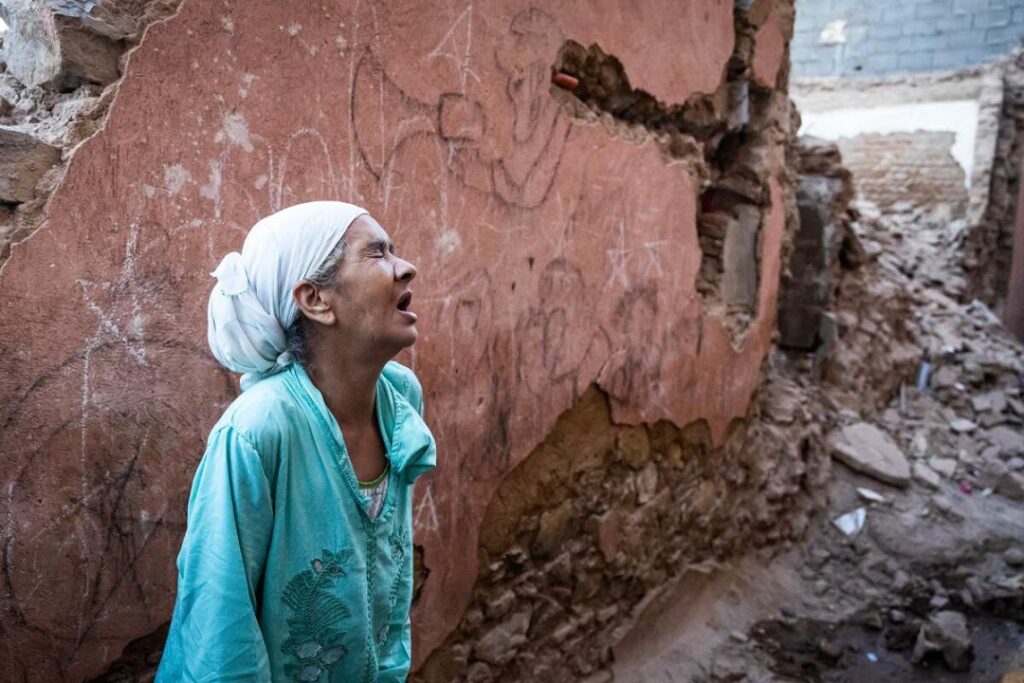- The earthquake, with a magnitude of 6.8, is the strongest to hit Morocco in 120 years.
- Its impact stretched from remote mountain villages in the Atlas Mountains to the historic city of Marrakech.
- The official death toll has reached at least 820 people, predominantly in Marrakech City.
In a devastating turn of events, Morocco was struck by a rare and powerful earthquake late Friday night. The catastrophe claimed the lives of over 800 people and caused extensive damage across the region. The earthquake, with a magnitude of 6.8, is the strongest to hit Morocco in 120 years.
The impact of the quake reached from remote mountain villages in the Atlas Mountains to the historic city of Marrakech. However, the full extent of the tragedy remains unknown. Consequently, rescuers face treacherous boulder-strewn roads to reach the hardest-hit mountain communities.
Residents awakened by the quake rushed into the streets in fear and disbelief. State television showed crowds gathered in the streets of Marrakech late at night, too afraid to return to buildings that may still be unstable.
Severe toll on Morocco’s historic sites
Eyewitness accounts described the horror of the moment. Reports indicated dishes and wall hangings falling, people being knocked off their feet, and an “intense vibration” shaking homes.
The earthquake has taken a severe toll on Morocco’s historic sites. The famous Koutoubia Mosque, dating back to the 12th century, sustained damage, as did parts of the iconic red walls surrounding the old city of Marrakech, a UNESCO World Heritage site.
The official death toll has reached at least 820 people. Most deaths have happened in Marrakech and the five provinces closest to the earthquake’s epicenter. An additional 672 individuals were reported injured, with 205 in critical condition, according to Morocco’s Interior Ministry.
Rescue efforts remained underway through the night. Responders worked tirelessly to find survivors amid the rubble and darkness. However, roads leading to the mountainous regions around the epicenter have been congested, hampering relief efforts.
World leaders have expressed condolences and offered assistance. Turkey, France, Germany, Ukraine, and Russia are among the nations expressing support and readiness to provide assistance. However, the Moroccan government has not yet formally requested for international aid.
US, African Union, Ukraine express solidarity
US President Joe Biden extended his condolences and sympathy to the victims of the recent earthquake that struck Morocco. He expressed deep sadness over the loss of life and the widespread devastation caused by this natural disaster. President Biden’s words conveyed not only his empathy but also the United States’ commitment to offering any necessary assistance to help Morocco cope with the aftermath of the earthquake.
Moussa Faki Mahamat, the head of the African Union Commission, expressed his deep grief over the tragic consequences of the earthquake, emphasizing the tremendous loss of life it brought. He extended his heartfelt condolences to the Moroccan king, the entire populace, and the grieving families of the victims. As such, Faki’s expression reflected the shared sense of empathy within the African Union during times of adversity.
Comoros President Azali Assoumani, who currently chairs the African Union, echoed these sentiments of solidarity and condolences. His words resonated with the pain felt by the African continent in the wake of this devastating earthquake in Morocco.
Moreover, the Ukrainian President Volodymyr Zelenskyy has expressed solidarity with Morocco following the earthquake. “Our deepest condolences to HM King Mohammed VI and all Moroccans for the lives lost in the horrible earthquake in the Marrakesh region. I wish those injured a fast recovery. Ukraine stands in solidarity with Morocco during this tragic time,” Zelenskyy said on social media.
Read Also: Hundreds killed as powerful earthquake strikes Morocco
Region’s vulnerability to seismic activity
Earthquakes are infrequent in North Africa, making this event particularly devastating. Moreover, the shallow depth of the quake, combined with the region’s vulnerability to seismic activity, has amplified the destruction.
The tragedy serves as a stark reminder of the importance of preparedness and resilient infrastructure in regions prone to earthquakes. Morocco has experienced devastating earthquakes in the past. As such, the government has effected changes in construction regulations. However, many structures remain vulnerable, especially in rural areas.
The impact of the current earthquake has extended beyond Moroccan borders, with reports of tremors felt as far away as Portugal and Algeria. As rescue and recovery efforts continue, the focus remains on aiding survivors and assessing the full extent of the devastation caused by this tragic earthquake.











